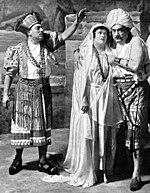Les pêcheurs de perles (The Pearl Fishers) is an opera in three acts by the French composer Georges Bizet, to a libretto by Eugène Cormon and Michel Carré. It was first performed on 30 September 1863 at the Théâtre Lyrique in Paris, and was given 18 performances in its initial run. Set in ancient times on the island of Ceylon, the opera is a story of how two men's vow of eternal friendship is threatened by their love for the same woman, whose own dilemma is the conflict between secular love and her sacred oath as a priestess. The friendship duet "Au fond du temple saint", generally known as "The Pearl Fishers Duet", is one of the best-known numbers in Western opera.
At the time of the premiere, Bizet was 25 years old and had yet to establish himself in the Parisian musical world. The commission to write Les pêcheurs arose from his standing as a former winner of the prestigious Prix de Rome. Despite a good reception by the public, press reactions to the work were generally hostile and dismissive, although other composers, notably Hector Berlioz, found considerable merit in the music. The opera was not revived in Bizet's lifetime, but from 1886 onwards it was performed with some regularity in Europe and America, and from the mid-20th century has entered the repertory of opera houses worldwide. Because the autograph score was lost, post-1886 productions were based on amended versions of the score that contained significant departures from the original. However, since the 1970s, efforts have been made to reconstruct the score in accordance with Bizet's intentions.
